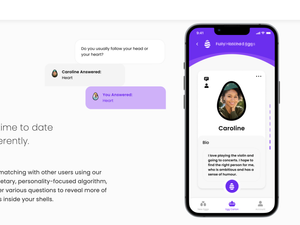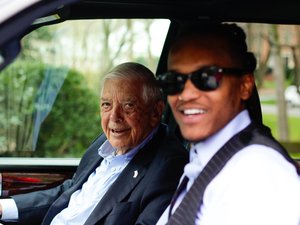
Logistics is big business. Just about everything in the room you’re sitting in was delivered on a boat, a plane or a train and was then transferred to and delivered by an automobile. This piece of insight from audiobook “The Millionaire Mind” would change the trajectory of Marvin Walker’s career.
Walker, the founder and CEO of Day Runner, is a seasoned entrepreneur. It started when he was growing up in Guyana, South America. Helping his dad with the family plantain business pre-Ziplock era at the ripe young age of 5, Walker found himself a key role in the supply chain, folding and sealing the bags with candle wax.
Years later, he ventured into the logistics industry, where he saw the potential to change a broken system — and he seized it.
Walker sold his house, emptied out his retirement and started developing the technology to facilitate a new logistics model. In 2017, Walker launched the Day Runner app, the first national brand for on-demand B2B deliveries, which soon expanded into the consumer market.
Walker describes the app as a hybrid of FedEx and Uber, making it convenient and fast for anyone to find the nearest “runner” with a vehicle to fit each specific delivery. The app allows customers to get all the details on the driver as well as up-front costs, real-time tracking and confirmations. Once the delivery arrives at its intended destination, Day Runner automatically charges the credit card on file.
But, while the Day Runner app is revolutionizing deliveries for businesses and consumers, Walker’s true focus lies with the drivers. He has lived all the pain points of being a driver and addresses them with Day Runner.
After Walker’s family moved to the States in 1982, Walker graduated high school and served in the Marines — where he developed his strong work ethic — before launching his own music marketing business.
But the economic downswing, along with the rise in online technology and apps that disrupted the music industry, caused Walker’s once successful business to dissolve. He went looking for financial stability, and he found it in the logistics space.
He also found ample room for improvement.
Walker contracted with his first company as a driver, using his own vehicle and taking on all of the fuel and maintenance expenses. His employer offered to compensate Walker 35 percent of the total delivery fee, with 65 percent going back into the company’s pockets. Walker’s request to get the simple compensation structure in writing was unmet. But, finding himself in need of a paycheck, Walker started work with the company anyway.
“Sure enough, there came a time when I made the exact same delivery, with the exact mileage, and somehow the pay was different. It didn’t make sense,” Walker recalls.
A few similar experiences there, and then a stint of jumping from courier company to courier company with the same results, left him frustrated and burned out.
Walker decided to go back into music. But, after spending six months and a $200,000 loan to jumpstart his music marketing company, the business fizzled once again.
“So, now I had this debt, and the bank said, ‘We need our money.’ I went and got a job paying $12.50 an hour driving a box truck because we’re creatures of habit, and we go back to what we know,” he recalls.
Walker was only taking home about $365 a week after taxes and knew that wasn’t going to sustain him. He quickly transitioned back to courier work where he knew the pay was higher. He started driving back and forth from Charlotte to Baltimore every day, making $3,650 a week. In seven months, his $200,000 debt was repaid.
While that had been the goal, now Walker was onto something bigger.
The company continued to give Walker more routes, which Walker subbed out. In time, he built a team of about 12 subcontractors, many with vehicles Walker bought for them and some with outstanding loans — like he had once had.
“If you pay a person fairly, they’ll take ownership and responsibility. And, if you help them, you can make money too. It pays to help people,” Walker says.
Eventually, his employer felt that the operation was getting too big and began to scale back on Walker’s routes. But instead of giving up, that’s when Walker decided to go big — and solve the problems he’d experienced firsthand as a driver.
That’s why Day Runner offers no-cost vehicle lease assistance for drivers struggling with credit, micro-loans for gas and maintenance if needed, daily pay for improved cash flow, plus full transparency and some of the highest commissions in the industry. Walker finds his drivers are happy to pay a small percentage for the services they receive through the platform if it means they can keep driving and stay in business.
“It’s a win, win, win. The driver is happy because he or she is paid fairly and can pay their bills on time. The customer is happy because they’re getting better service from somebody who’s happy, and I’m happy because our company is making money and it’s scalable,” Walker says.
Today, there are 7,000 drivers on the Day Runner platform in 14 different states and growing. Now, he advises other startups to always be learning.
“Develop great ideas that can change the world. There is no such thing as failure,” he says.
For more stories like this, subscribe to StartCharlotte’s free weekly startup newsletter.








